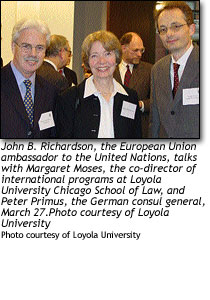 |
 |
|||||
 |
 |
 |
 |
 |
God, Europe and the pope Debating religion’s role in the EU constitution By Michelle Martin Despite Pope John Paul II’s call for a new European Union constitution to recognize the continent’s 2,000-year-old Christian heritage, the union would do best by following the American policy of separation of church and state, said John B. Richardson, the EU ambassador to the United Nations. Richardson, who was speaking about the union’s expansion at an international law conference at Loyola University Chicago, said the European experience has made it clear that the continent can never be treated as one nation, even if it expresses common values in the areas of human rights, free markets and even, eventually, a joint foreign and security policy. “Any attempt to apply a ‘melting pot’ approach was doomed to failure,” Richardson said, adding that the union now tries to preserve the essential elements of national, regional and ethnic identity. On several occasions, Pope John Paul II has used meetings with European Union officials or leaders of current or prospective EU countries to call for the recognition and protection of Europe’s Christian heritage in the union’s constitutional document. Last fall, the pope told Belgium’s new ambassador to the Vatican that the new Europe must be founded “on common values, taking into account the Christian roots of the different peoples.” “The decisive role of Christianity and of the Christian vision of man to the history and culture of different countries is part of a common treasure and, therefore, it appears logical that it be written into the project of the European Convention, the pope told ambassador Benoit Cardon De Lichtbuer in an Oct. 31 meeting. These are sentiments the pope has repeated on several occasions as the European Union has debated its future. The 15-member union is set to add 10 mostly Central and Eastern European countries as members next year. In the meantime, officials are trying to draft either a constitution or constitutional treaty that will express the union’s shared values, such as free markets and respect for human rights. In an interview following his March 27 speech, Richardson said that formally acknowledging one religious tradition could contradict those values—even if the values themselves are rooted in religion. “Some of the values I’ve talked about, like the value of solidarity, quite clearly originally could be said to have Christian roots,” said Richardson, a British native who has spent most of his professional life promoting European integration. “My own personal attachment comes from that. But they could equally come from other roots. They could come from Islamic roots, for example. They could come from Jewish roots. … Whatever it is, those values come through the culture of Europe now, and it’s that culture that dictates the values we put into our political system. I don’t believe any longer that it would make sense to say that Christian practice is the basis of the politics of the European Union.” The difficulty comes in finding a common root for ethical rules of behavior, he said. “Once upon a time those rules used to be based upon the Christian moral code, and/or the consensus of the community in which we lived,” he said. “That was the classic Christian village scenario. With urbanization, we have gradually lost that sense of a community whose values we conform to. With the decline in the practice of Christianity, we’ve been losing also the ethically based rules of behavior, and we’re basically left with the legal system. The legal system is a very imperfect way of doing this because people tend to regard the legal system as set of boundaries which should not be transgressed, rather than a set of principles which should guide behavior.” Relying on the legal system creates a kind of “moral vacuum,” and the attempt to fill it has caused the debate over adding language about religion to the European Union constitution. But for Richardson, the answer comes from another union with historically Christian roots. “I believe quite strongly that one of the things we ought to have learned from the Constitution of the United States is the divorce between church and state, and that we should keep the two separate,” he said. “Keep the state for the rule of law and the church for the behavior of individuals, and they should be mutually reinforcing and compatible, but they should be separate.” Front Page | Digest | Cardinal | Interview |
||